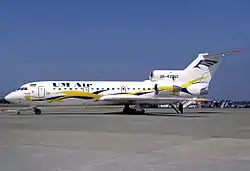Ukrainian-Mediterranean Airlines Flight 4230
Ukrainian-Mediterranean Airlines Flight 4230 was a chartered international passenger flight, a Yakovlev Yak-42D operated by Ukrainian UM Airlines, which crashed in 2003.
 The aircraft involved in the crash, seen here at Antalya Airport in 2001 | |
| Accident | |
|---|---|
| Date | 26 May 2003 |
| Summary | Controlled flight into terrain due to poor visibility |
| Site | Maçka, Trabzon |
| Aircraft | |
| Aircraft type | Yakovlev Yak-42 |
| Operator | Ukrainian-Mediterranean Airlines |
| Registration | UR-42352 |
| Flight origin | Manas International Airport Bishkek, Kyrgyzstan |
| Stopover | Trabzon Airport, Trabzon, Turkey |
| Destination | Zaragoza Airport, Zaragoza, Spain |
| Occupants | 75 |
| Passengers | 62 |
| Crew | 11 |
| Fatalities | 75 |
| Survivors | 0 |
Flying from Manas International Airport, Bishkek, Kyrgyzstan to Zaragoza Airport, Spain, the Yak-42D tried to land at Trabzon Airport in Turkey to refuel on May 26, 2003, but, because of dense fog, it slammed into a mountain near Maçka, Trabzon.[1] All 13 crew and 62 passengers were killed. It remains the third-worst crash in Turkish aviation history.[2]
Accident
The Ukrainian-Mediterranean Airlines Yakovlev Yak-42 was a chartered aircraft being used to transport Spanish troops after a four-month peacekeeping tour of Afghanistan. The final destination was Zaragoza Airport, but the aircraft attempted to stopover at Trabzon Airport in Turkey in order to refuel. The aircraft crashed into the side of a mountain near the town of Maçka, 15 miles (24 km) from Trabzon, on its third attempt to land in dense fog.[3] The pilot had stated that he could not see the runway; visibility was less than 10 metres (33 ft).[1]
All crew and passengers were killed in the impact. The troops on board comprised 41 members of the army and 21 members of the air force.[4] The aircraft was also carrying ammunition; explosions after the crash distributed the wreckage over a large area.[5]
Passengers and crew
| Country | Passengers | Crew | Total |
|---|---|---|---|
| Spain | 54 | 0 | 50 |
| Iran[6] | 18 | 0 | 18 |
| UK | 8 | 0 | 8 |
| Ukraine | 0 | 10 | 10 |
| Belarus | 0 | 1 | 1 |
| Total | 62 | 13 | 75 |
Context
The aircraft had been chartered from the Ukrainian Ukrainian-Mediterranean Airlines by the Spanish defence ministry to return some of the 120 Spanish troops working as International Security Assistance Force peacekeepers in Afghanistan. It was the third crash of a Ukrainian-operated aircraft within six months; an Ilyushin Il-76 had crashed on 9 May, killing around 14 people,[7] and the previous December saw an Antonov An-140 crash in Iran with 44 fatalities.[1]
Aftermath
Spanish defence minister Federico Trillo stated, "the meteorological conditions and dense fog caused the drama."[8] NATO Secretary-General George Robertson stated, "This is an appalling tragedy, given that these soldiers were serving the interest of peace in a difficult mission in Afghanistan."[5] In 2004, the Spanish government sacked three generals after it was discovered that 22 of the victims' bodies had been misidentified and returned to the wrong families.[9]
See also
References
- "Turkey air crash kills Spanish troops". BBC News. 26 May 2003. Retrieved 15 January 2014.
- "Yakolov 42D UR-42352 Maçka". Aviation Safety Network. Retrieved 15 January 2014.
- "Spanish peacekeepers killed in plane crash". The Independent. 26 May 2003. Retrieved 15 January 2014.
- Wilkinson, Isambard (27 May 2003). "75 peacekeepers die in plane crash". Daily Telegraph. Retrieved 15 January 2014.
- "Plane crash in Turkey probed". Chicago Tribune. 27 May 2003. Retrieved 15 January 2014.
- "هولناک ترین سوانح هوایی در تاریخ ؛ نام ایران هم در این لیست هست" [The most terrible air accidents in history; The name of Iran is also in this list]. Bit Ran (in Persian). 23 November 2021. Retrieved 19 April 2023.
- "Safety Review" (PDF). Flight International. p. 39. Retrieved 15 January 2014.
- Daly, Emma (27 May 2003). "75 peacekeepers die in plane crash". The New York Times. Retrieved 15 January 2014.
- Lee, Keith (19 July 2004). "Spain: military chiefs replaced over Yak-42 plane crash". World Socialist Web Site. Retrieved 15 January 2014.